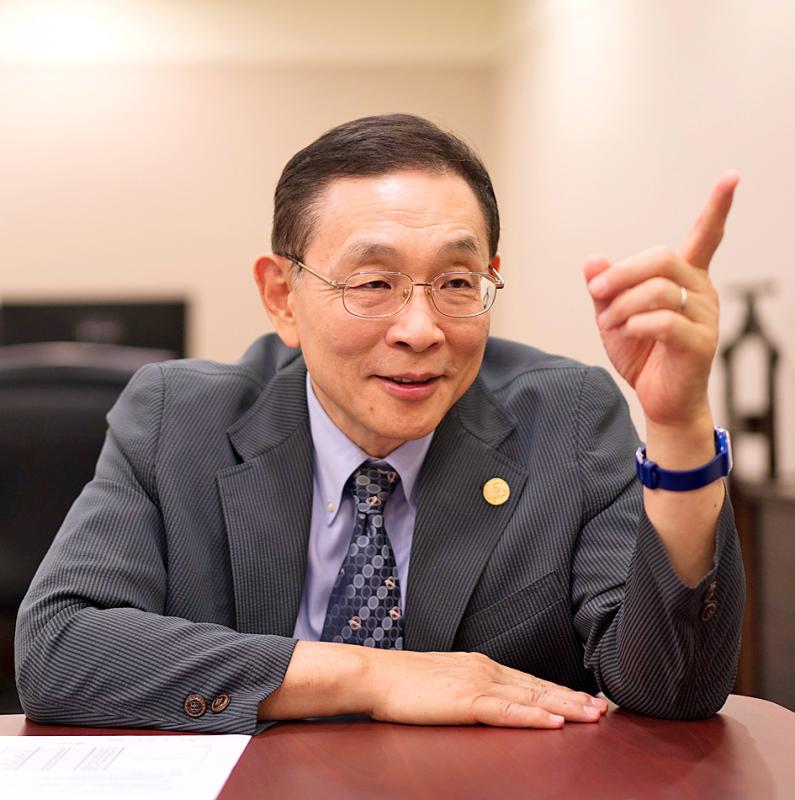Macronix International Co (旺宏), the world’s biggest supplier of NOR flash memory chips, yesterday said it plans to allocate NT$41.5 billion (US$1.48 billion) to expand 12-inch wafer capacity for advanced 3D NAND and NOR flash memory chips, as it has technology readiness and there is robust market demand.
Some of the new chips will be designed for vehicles, Macronix said.
The company aims to this year become the world’s largest supplier of NOR flash memory chips used in automobiles.

Photo courtesy of Macronix International Co
The outlay is for a second-phase expansion of Macronix’s Fab 5 in Hsinchu, and the company expects to ship the first chips from the new production line in the fourth quarter of next year, while the line would begin contributing revenue in 2023.
“We will be very careful and disciplined in carrying out this capital expenditure plan,” Macronix president Lu Chih-yuan (盧志遠) told investors during a quarterly online conference.
“It is a multi-phase capacity expansion plan,” Lu said.
The capacity expansion would help boost Macronix’s profit growth and enhance its flexibility in product allocations, Lu said.
The Fab 5 is to have an installed capacity of 40,000 12-inch wafers per month, up from 20,000 wafers, he said.
The new investment would not compromise its gross margin, he said.
Gross margin improved to 39.1 percent last quarter, the highest since the second quarter of 2018.
Macronix’s net profit surged 45 percent to NT$1.93 billion last quarter on higher shipments and better prices, compared with NT$1.33 billion a year earlier.
On a quarterly basis, net profit soared 110 percent from NT$916 million, the company said.
Earnings per share increased to NT$1.04, from NT$0.72 a year earlier and NT$0.5 last quarter, it said.
The company is upbeat about this quarter, expecting full factory utilization on the back of robust demand.
“We expect this situation to extend into this quarter. We are optimistic about the fourth quarter,” Lu said. “We do not see any negative indicators.”
The company expects strong demand for read-only memory (ROM) chips due to seasonal factors, Lu said.
Macronix is a long-term ROM supplier to Nintendo Co.
ROM chips accounted for 27 percent of Macronix’s total revenue last quarter, compared with 26 percent in the first quarter. NOR memory chips made up 50 percent, while NAND memory chips contributed 16 percent. The remaining 7 percent was from foundry services.
Macronix expects to strike a deal with a potential buyer for its 6-inch fab this summer.
The fab has contributed NT$1.3 billion to NT$1.4 billion a year in revenue.

South Korea’s equity benchmark yesterday crossed a new milestone just a month after surpassing the once-unthinkable 5,000 mark as surging global memory demand powers the country’s biggest chipmakers. The KOSPI advanced as much as 2.6 percent to a record 6,123, with Samsung Electronics Co and SK Hynix Inc each gaining more than 2 percent. With the benchmark now up 45 percent this year, South Korea’s stock market capitalization has also moved past France’s, following last month’s overtaking of Germany’s. Long overlooked by foreign funds, despite being undervalued, South Korean stocks have now emerged as clear winners in the global market. The so-called “artificial intelligence

CONFUSION: Taiwan, Japan and other big exporters are cautiously monitoring the situation, while analysts said more Trump responses ate likely after his loss in court US trading partners in Asia started weighing fresh uncertainties yesterday after President Donald Trump vowed to impose a new tariff on imports, hours after the Supreme Court struck down many of the sweeping levies he used to launch a global trade war. The court’s ruling invalidated a number of tariffs that the Trump administration had imposed on Asian export powerhouses from China and South Korea to Japan and Taiwan, the world’s largest chip maker and a key player in tech supply chains. Within hours, Trump said he would impose a new 10 percent duty on US imports from all countries starting on

Chinese artificial intelligence (AI) start-up DeepSeek’s (深度求索) latest AI model, set to be released as soon as next week, was trained on Nvidia Corp’s most advanced AI chip, the Blackwell, a senior official of US President Donald Trump’s administration said on Monday, in what could represent a violation of US export controls. The US believes DeepSeek will remove the technical indicators that might reveal its use of American AI chips, the official said, adding that the Blackwells are likely clustered at its data center in Inner Mongolia, an autonomous region of China. The person declined to say how the US government received

Like many of us who are mindful of our plastic consumption, Beth Gardiner would take her own bags to the supermarket and be annoyed whenever she forgot to do so. Out without her refillable bottle, she would avoid buying bottled water. “Here I am, in my own little life, worrying about that and trying to use less plastic,” she says. Then she read an article in this newspaper, just over eight years ago, and discovered that fossil fuel companies had plowed more than US$180 billion into plastic plants in the US since 2010. “It was a kick in the teeth,” Gardiner